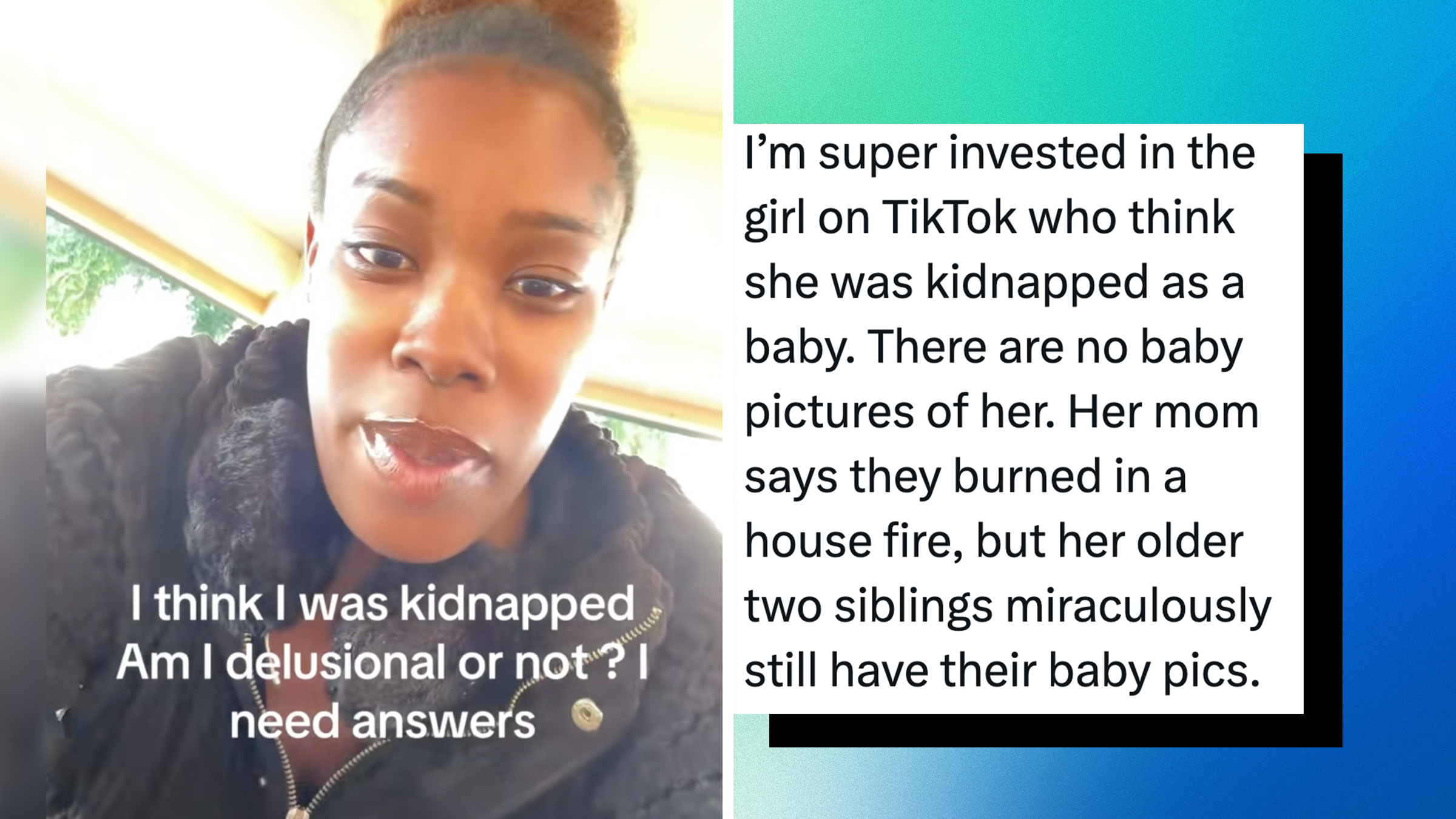Skye Budnick went missing on April 1, 2008. Fifteen years later, her sister Megan Lebron is documenting everything she knows about the disappearance to a TikTok audience of over 100,000.
Lebron learned that Budnick had boarded a one-way flight to Japan and was last seen in Noboribetsu on April 10. Lebron has been left to agonize over the details. So, she began posting on YouTube and TikTok and created the podcast Surviving Skye.
Her YouTube channel was inundated with abuse towards Budnick—but Lebron found her 96% female TikTok audience more receptive.
“I tried doing some YouTube stuff years ago but it was a bit more of the Wild Wild West, and the response was gross,” Lebron told the Daily Dot. “It wasn’t good for anybody.”
Amid abundant stereotypes of the types of people who consume true crime media—they’re more often female and more often white—survivors, activists, and even perpetrators of crime are asking for more thoughtful dialogue in the oversaturated market of crime content.
Lebron values the “safe space” she’s cultivated. A few Reddit forums, a couple of YouTube videos, and her own content have helped her control the narrative around her sister’s disappearance, something survivors claim is integral to the cutthroat media landscape.
Serial triggered the 2010s podcast boom with a controversial reversal of a true crime narrative: casting the accused as the victim.
According to Kelli Boling, an assistant professor at the University of Nebraska-Lincoln, 73% of true crime podcast listeners are women, in part because they identify with the predominantly female victims featured.
While 80% of podcast listeners believe they are making a difference to the cases covered, some just want reassurance that they know how to survive a similar horror.
Crucially for podcast hosts, women are reliable consumers: CrimeCon 2023 saw 5,000 attendees and made $1,745,000 in ticket sales alone.
“All true crime podcasts are not created equal,” Boling wrote in her dissertation on true crime.
Sometimes fans praise the victim-centric narratives of true crime podcast Crime Junkie, and sometimes they criticize host Ashley Flowers’ plagiarism. Some love the humor of My Favorite Murder, while others criticize the whiplash shift from harrowing stories to comedy.
John Lordan, known as LORDANArts online, pivoted to crime content because of his interest in the disappearance of Elisa Lam at the Cecil Hotel which gained significant traction among web sleuth communities. He told the Daily Dot that true crime helped him give back to others.
“I finally felt something that I was searching for my whole life,” Lordan said. “A way to give to others in a unique and meaningful way.”
Beyond content creation, he donates to charities like the National Center for Missing and Exploited Children, Destiny Rescue, and GoFundMe pages.
But John says TikTok encourages the sensationalizing of true crime. He told the Daily Dot that true crime videos on TikTok are insensitive to victims and their families and “using these stories for contrived emotional takes meant for little more than to hook the attention of an audience.”
Survivors make up a niche subset of listeners. One subject in Boling’s study of domestic violence survivors had been encouraged by a therapist to listen to understand her abuser’s psyche.
However, exposure therapy and gratitude for survival do not benefit everyone.
Writer Emma Berquist was stabbed in a random attack in New Zealand in 2019. The experience made her wonder what would have happened to her story if she hadn’t survived; she criticized the true crime genre in an essay entitled “True crime is rotting our brains” and on the You’re Wrong About podcast.
“I think I would rather get stabbed again than have TikTok users descend like vultures on my social media, zooming in on pictures of my messy bedroom to analyze the tedious minutia of my deeply average life,” she wrote in 2021.
Berquist told the Daily Dot she thinks of the attack “like a natural disaster.”
“It’s just something that happened and I survived and you pick up the pieces and move on,” Berquist said. “But you can’t really be mad at a natural disaster.”
Like with any disaster, the symptoms lingered. Berquist said she struggled with anxiety when hearing someone behind her and paranoia when wearing headphones after the attack.
Hypervigilance is a common symptom of post-traumatic stress disorder. It can also occur in listeners who haven’t personally experienced crime who preach carrying keys between their fingers, 24/7 location tracking, and “murder kits”.
Fans might brand these “survival techniques”, or the necessary steps to “stay sexy and don’t get murdered”—a phrase Berquist views as victim-blaming. But Berquist sees this mindset as an obstacle and points out that anecdotes aren’t data. Case in point: crime rates have declined over the last 18 years, and murder rates are a third of what they were in the 1990s.
In the over-saturated podcast market, horrific earth-shattering events are meticulously dissected by wine-obsessed white women. It’s a phenomenon Terra Newell has been subject to since stabbing her former stepdad John Meehan in self-defense on August 20, 2016.
First covered by the LA Times podcast, then fictionalized in Dirty John, Newell's story has more afterlives than she can keep track of, with creators rarely reaching out before covering her story.
Newell told the Daily Dot that when the podcast was released in October 2017, she had little time to process the events privately before they became public.
“You’re forced to do it with everyone looking at you, in a sense, as an entertainment factor,” she said.
Some viewers said Newell was spoiled, or that she deserved what happened to her. In response, Newell says that she pays attention to some critiques and not others.
“If you don’t play that perfect victim,” Newell said, “They’re like, ‘I’m gonna have a problem with this or that.’”
In some ways, Newell is the perfect victim: a white woman from a good background. These victims are more likely to receive public sympathy because of media portrayals and subconscious bias. These victims are shown as infallible and innocent, unlike Black or low-income victims who may be depicted as in some way blameworthy.
But even Newell’s unapologetic attitude has vilified her among some viewers: Her video describing the attack received backlash after she wore a Harley Quinn “daddy’s little monster” T-shirt.
In January 2023, Newell started her own true crime podcast called Survivor Squad, in which she advocates for ethical true crime.
For some, ethical true crime means avoiding amateur content (e.g., not produced by journalists); for others, it means listening to victims and co-victims before consuming content.
When asked about how to consume ethical true crime, Newell said she advises true crime junkies to avoid content that focuses on stories that victims or their family members have said they don’t want a spotlight on.
Her podcast was born out of this concern. Frustrated by the exploitation she and her co-host Collier Landry have endured, they wanted to help survivors tell their own stories. Landry has his own true crime past, described in their podcast introduction as “the kid who stood up to his father in court for killing his mother.”
“Some people want to share their stories,” Newell told the Daily Dot. “And others just want to be left alone.”
Newell has also seen a positive impact. Other victims of her estranged stepfather, John Meehan, have reached out, as well as domestic abuse survivors who recognized abusive behavior in their own lives.
“That was the reason to speak out in the first place,” Newell said. “We were hoping it could just reach at least one person that could relate and leave that relationship.”
It’s also about awareness for Lebron, whose sister went missing. She says there are imperfect systems in place for missing people and their grieving families: Insensitive police officers, student loan debt, and language barriers have made it difficult to get answers.
Even though true crime can highlight injustices, Berquist worries that it affects people’s worldviews and convinces them they could be the victim of a crime.
University of Nebraska’s Boling grapples with this when comparing podcasts.
“It’s so much easier for true crime podcasts or documentarians to say, ‘We’ll center the accused because we think they’re wrongly accused,’” in an effort to reform the criminal justice movement, Boling told the Daily Dot.
But these types of podcasts almost always center on a single story and fail to address underlying systemic issues.
No matter the value of true crime podcasts, Boling encourages listeners to be more self-aware and critical of their consumption.
“It’s important to realize why you’re consuming media, what you’re getting from it, and to be thoughtful about that,” Boling said.







